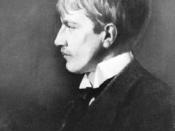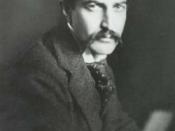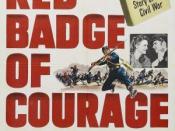To understand the role nature plays in The Red Badge of Courage, we must analyse Crane's use of imagery and references to nature in relation to Henry's experiences. We must also note the personification of nature, which allows us to speculate upon its attitude towards Henry (or to humanity), under the presumption that it actually has the ability to care or not.
Naming army troops and weaponry as monsters, dragons, reptiles and serpents is common in the first four chapters, thus giving nature a military connotation. Tents "[spring up] like strange plants. Camp fires, like red, peculiar blossoms, [dot] the night". The shells "[look] to be strange war flowers bursting into fierce bloom". Crane goes as far as to name war itself "the red animal". During battle, the skirmishers are "firing at the landscape" and their bullets fly "into thickets and at distant and prominent trees". The enemy is finally named, as the "advance upon Nature [seems] too calm."
Henry thinks that "he [does not] relish the landscape. It [threatens] him." The notion of a battle between nature and mankind is thus clearly exposed. Therefore, The Red Badge could be interpreted as a young man's development through this battle.
Henry is presented as a young, inexperienced man with a naive vision of life and war.
In times of doubt, he tends to isolate himself; he "[keeps] from intercourse with his companions as much as circumstances [allow] him", even though "a sympathetic comparison of mental notes would have been a joy to him." However, when battle arrives, "he [becomes] not a man but a member", a part of a "subtle battle brotherhood, [...] a mysterious fraternity". A sence of belonging fills him with strength and disperses his fear. However, the following battle proves to be too much for an inexperienced...



The red badge of courage
A very good analysis, some inspirational thought and great use of quotes to display the imagery of Henry's experiences. However the essay would be more interesting and perhaps thought provoking if the context of the quotes was explained a little more rather than re-telling the story, some thought or opinions could strengthen the analysis.
7 out of 7 people found this comment useful.